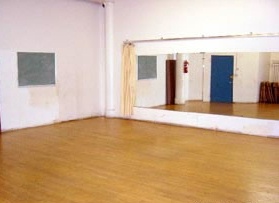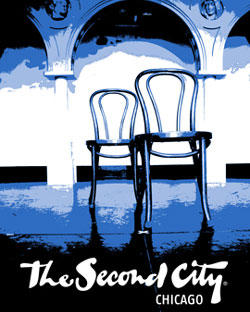"You do not have the right..."
 "...to use this art form to feel inferior."
"...to use this art form to feel inferior." Martin de Maat (1949-2001)
I haven't been myself recently. For the past several weeks, I had allowed my ongoing job search to affect other things like my daily responsibilities, personal relationships, and yes, even blogging. As I started to search around for a little inspiration to snap out of it, I thought back to the final day of my Level 1 improv class at The Second City NY Training Center, where I was lucky to have been taught by a wonderful teacher just several weeks before he passed away.
Martin de Maat literally grew up around the original Second City theater in Chicago. He began when he was 9 years old, studying with his aunt Josephine Forsberg, one of the founding instructors in improvisation for the theater. As a teenager, he worked there as a dishwasher, and eventually went on to become the Artistic Director for all of the Training Centers. In many ways he was the heart of The Second City, influencing thousands of young improvisors including Chris Farley, Tina Fey, John Favreau, and Sean Hayes (from "Will & Grace"). He later moved to NY and joined the faculty at Columbia University.
I had enrolled in the Level 1 improv class more or less on a whim. I had seen a show at The Second City's main stage on a business trip to Chicago, and was caught up in the creativity and sense of fun the performers seemed to be having onstage. The training program was divided into six levels, each level consisting of a series of three-hour classes every Saturday for 8 weeks. For me, it involved getting up at 7 a.m., driving 45 minutes to Trenton, taking the NJ Transit train into Manhattan, and hopping onto the subway to reach my class in Greenwich Village--all in all it was a three-hour commute that would have to be repeated later in the day for the return trip to Philadelphia.
All of the other fifteen or so students in my Level 1 class were actors trying to scratch out a living as waiters, hostesses, and office temps while they went around the city to one endless audition after another, hoping to catch their big break. Our instructor was Chris, who had graduated from the main Training Center in Chicago and who was getting his Masters degree in theater. Technically, the entire Level 1 coursework was designed to have the students focus on non-verbal techniques to establish a scene, the idea being that many first-time improvisors tend to fall back on jokes and punch lines as a crutch to fill the silence, ignoring their partners just to go for a cheap laugh. Chris noted the progress that our group had made early on, and after swearing us to secrecy that we wouldn't blab to the other Level 1 classes, he began to have us improvise full scenes with dialogue.
Our classroom was a small rehearsal space in an old building with bare wood floors, dingy white walls with no windows, and a long mirror that stretched across the entire front wall. The only furniture was about twenty plain wooden chairs scattered around the room. In improv, there are no props or set pieces or costumes to hide behind. It is just you and your scene partner out there on stage, establishing whatever reality the two of you eventually discover by working together. The bare nature of the space allowed us to feel free to begin our scene anywhere from a corporate boardroom or a London pub to a brothel in the Old West. Chris would explain one of the advanced techniques for establishing and building an improv scene, and then he'd ask for volunteers to come up in groups of two and three to try them out. We would all be lined up along the back wall as he explained a particular idea, then he would call out "Give me two people up front." It was up to each individual to step out from the wall and put themselves out there in front of the rest of the class. The first two people to reach the center of the room would be the ones to begin the scene.
At the beginning of an improvised scene, neither person should have any pre-conceived idea about where the scene will be set or what the nature of the relationship is between the two characters. No dialogue, no plot--just two people working together to come up with a scene in the moment. I was always eager to step out quickly from the line whenever Chris would ask for volunteers, but especially in that first semester those moments as I moved towards the front of the room were often intense. To me it felt like standing at the edge of a high dive platform, willing yourself to take a leap out towards an empty pool below. You just had to have faith that you and your scene partner would be able create something together to fill the up pool before you hit the bottom.
I enjoyed my time spent in class, and loved being around my other classmates. As I got to know them all better, I really admired their willlingness to sacrifice and do whatever it took to pursue acting as a profession. I felt a little like an imposter sometimes, having a steady, good-paying job and just taking these classes as a fun hobby. As the end of the first level drew to a close, I began to question whether I should enroll in the upcoming Level 2 class, or just chalk the experience up to a one-time thing. My attitude changed on the last day of the semester, when Chris asked his former teacher Martin de Maat to sit in on our final class.
Martin just radiated genuine warmth and acceptance. He had us run through some improv exercises, and gave nothing but support and encouragement throughout the day. He took the time to make at least one positive comment to each of us individually after we would finish a particular scene. He was like a motivational speaker, coach, and favorite uncle all rolled up into one. The room was filled with an incredible spirit of trust and positive energy for the entire three hours.
He pulled a chair into the center of the room and sat down facing us during the last 10 minutes of class. He was battling the final stages of pneumonia at this point, and it had taken great effort for him to come out in the harsh winter weather to be with us that day. He began to speak in a quiet voice barely above a whisper, and you could see the physical difficulty he was having as he paused to draw each breath. I found myself leaning forward in my seat to be able to catch every word. We had expected him to end on a happy note, with more laughter and warm advice. Instead, a serious expression came over his face, and he looked straight at each of us as he said the quote that forms the title of this post:
"You do not have the right to use this art form to feel inferior."
We were all taken aback a little at first by the change in tone, wondering where this was coming from. He went on to tell us that we were each unique, and that it was important for us to accept ourselves and trust in the moment and the people around us. We needed to find the courage to say that we were each worthy to be here and to get behind our own dreams. We should take joy in our failures, and not waste time being judgmental of ourselves and others. If we put ourselves in a place of support and unconditional acceptance and love of who we were, we could only grow. It started to become clear that he was talking not just about improvisation, but how we should strive to live every single day as well. He said that ultimately, it was up to us to get behind our own goals and take action for them. His voice took on a heartfelt tone as he ended with his final words:
"I do not give you permission to fail--
I'm giving you permission to follow your dreams."
I imagine that as words on a screen, that all might sound contrived and a little like New Age doubletalk, but coming from Martin as he struggled to find the breath to say those words with complete sincerity, we couldn't help but feel empowered. He got up and wrapped each one of us in a hug, and thanked us for allowing him to be a part of our class. We should have been the ones thanking him. His words had been exactly what I needed to hear at that moment, and on the train ride home I decided that on Monday I would pick up the phone and enroll in the Level 2 classes. Which eventually lead to my signing up for the rest of the levels and culminated in a final class performance that turned out to be one of my most enjoyable nights ever onstage. My enthusiasm was soon matched by sorrow just a few weeks after the end of that first semester when the Training Center sent out an email that said Martin had passed away from complications from pneumonia, with his sister by his side at the hospital for his final moments. I took the day off of work and went up to NY for his memorial service, so grateful that I had the chance to learn from him just before he was gone.
I thought back to that day in the classroom as I took a moment to look at things recently. I had allowed outside events to get in the way of what was truly important. I realized that I needed to start taking action on my own again. I've already changed my approach to this job search and obviously I've begun to blog again. And earlier this week I went and booked a flight to Chicago and enrolled in some workshops during the 9th Annual Chicago Improv Festival at the end of April. I'm going out there not because I'm planning on rejoining a local improv group or because it might translate into skills that I could use in the courtroom, but because I wanted to experience that feeling of freedom and fulfillment from challenging myself to look within and create something out of nothing.
I just decided that it was about time for me to move away from the back wall and take a step forward again.


<< Home